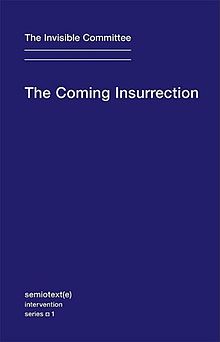
Responses to The Coming Insurrection are ambivalent, with some claiming it to be an important volume of left-wing theory, while others seeing in it elements of anti-modern thought and right-wing extreme fundamentalism. The work takes its inspiration from the ideas of Carl Schmitt, and is often touted as perpetuating political violence against the rule of law and democracy. The call for violence is not wholly unjustified, as the pamphlet contains an explicit call for violence to liberate territory from police occupation. Adherents of democracy are declared fanatics, with the very form of democracy as an enemy. The pamphlet written anonymously, draws on Schmitt’s ideas of the state of emergency, and the concept of the political. Heidegger is invoked for his ideas pertaining to resenting the technology and modernity. The authors take their impressions to the extreme, when even pretty innocuous looking matters in the present day scenario are equated with the relativism of imperialism, in turn dictated by the fundamentalism associated with the right wing (ala Arundhati Roy!!!). In his article in the FAZ, Nils Minkmar celebrates the antidemocratic manifesto as a “brilliantly penned diagnosis of our time” and speculates that it will become “the most important left-wing theory book of the age”. Of course the most questionable part of this statement is whether this a leftist book at all. But the FAZ author was particularly impressed by the anti-modern sentiments it contained. Towards the end, though, he does admit that the “black SUVs” that will follow on the heels of the state’s destruction will no doubt be worse that what we have now. The present intellectual zeitgeist is permeated with branding anything western an ideal as authoritarian or totalitarian (ala Roy again, Patkar, and the holy comrades of the left parties in India, to cite a few), which is tutored by a rhetoric that gate crashes into logic. The ideas somehow mirror Agamben’s The Coming Community. Agamben wrote in his magnum opus “Homo sacer”: “In modern democracies it is possible to state in public what Nazi biopoliticians did not dare to say.” With the help of Carl Schmitt’s theories on the “state of emergency” and Foucault’s concept of biopolitics, he places human rights and race laws, intensive care units and concentration camps on a par. It appears that the book is a naive translation of Agamben’s theories. The way to combat the so-called “normalisation of life” in modern societies, is to seek out invigorating salvation in a “state of emergency”, a far cry from democracy, rule of law and the market economy – this idea of a better age minus all coordinates of the present day comes from Schmitt and Heidegger, as does the search for hidden totalitarianism within democracy.

[…] Simply trying harder to elect better candidates will not fix the familiar structural problems of democracy, such as plundering special interest groups, ever-expanding bureaucracy, and election contests with […]